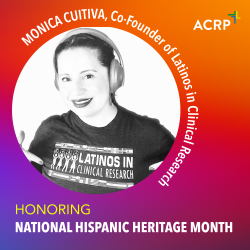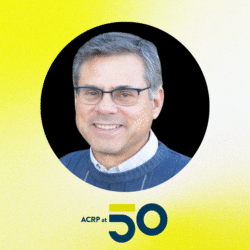The clinical research industry is increasingly recognizing the need for diversity, especially as it relates to the Latino population and other minorities.
Latinos are playing a growing role, both as professionals and participants, but significant challenges remain that must be addressed, including the lack of enough professionals who reflect the communities we are trying to serve. In areas with large Latino populations, it’s essential to have clinical research coordinators, data managers, and principal investigators—among other professionals—who understand the cultural nuances and can build relationships.
One major development is the expansion of clinical trials into Latin America. Sponsors are conducting more studies in the region, capitalizing on its diverse population and faster recruitment rates. This shift is driving greater interest from the Latino community to join the workforce. However, this expansion is not just about increasing numbers; it is about understanding and reflecting the communities involved. Bilingual, culturally aware professionals are essential to bridge the gap between research teams and participants in terms of fostering trust and improving outcomes.
The need for more Latinos in the clinical research workforce is equally critical in the U.S. The latest U.S. Census estimates show that Latinos accounted for more than 70% of the overall population growth between 2022 and 2023, largely due to high birth rates in Hispanic communities. This rapid expansion is vital when considering healthcare equity. The Latino population is growing at a much faster rate than the non-Latino population, and this has significant implications for clinical research. More Latino professionals are needed to ensure studies are relevant, inclusive, and beneficial to all the communities, especially the most affected by specific illnesses, conditions, or comorbidities.
Despite these trends, barriers persist. For example, something so basic as having documents translated into Spanish is still a common challenge that we face, making it difficult for potential participants to understand critical information. This oversight prevents participation and jeopardizes the goal of inclusive research. Additionally, the clinical research workforce lacks sufficient Latino professionals who reflect the communities they serve, which is essential for building trust and encouraging greater involvement.
To move forward, the industry must focus on recruiting more Latinos into clinical research roles. With the Hispanic population rapidly growing in the U.S., this is not just an issue of inclusion, but one of quality healthcare. Latino professionals bring critical language skills and cultural insight that can improve study design, communication, and overall trial success. Increasing Latino representation in the workforce is essential for improving healthcare outcomes for Hispanic communities and ensuring that clinical trials are reflective of the populations they aim to serve.
The challenges Latinos face in clinical research—whether it’s language barriers, lack of representation, or systemic issues—are real, but they can be addressed with targeted efforts. The industry has an opportunity to not only expand diversity but to ensure that this diversity leads to better, more equitable healthcare. This is a critical issue that affects many aspects of healthcare and deserves continued focus.
Leaders like [ACRP member] Judy Galindo, MAS, CCRC, Executive Director and Co-Founder of Sun Valley Research Center in Imperial, Calif., are addressing these challenges. Her site is located in a predominantly Hispanic area, and she understands firsthand the difficulties Latinos face in breaking into the industry and participating in studies. Her work shows that while we acknowledge the importance of diversity in clinical trials, we still need actionable steps to make it a reality. It’s not enough to say we need more diversity; we have to ensure we are doing everything we can to support that diversity and walk the talk.
The involvement of Ashley Margo, a Senior Clinical Research Associate for a major research services company, reflects her commitment to driving meaningful change in the clinical research industry. As a seasoned professional, she has successfully navigated the complexities of trial management, regulatory compliance, and participant recruitment. Despite the challenges she’s faced, Ashley remains dedicated to mentoring and guiding the next generation of Latino professionals, proving that there is space for them in this field and inspiring others to overcome obstacles and pursue careers in clinical research.
My name is Monica Cuitiva, and I’m a site owner in a highly diverse area as well as, with Judy and Ashley, a co-founder of Latinos in Clinical Research, The Save Our Sites Conference, and The University of Clinical Research. Alongside other industry champions, we are dedicated to driving meaningful change in the clinical research ecosystem by advocating for diversity and supporting future professionals who are entering the field. Our work also focuses on collaborating with sites and industry leaders to address challenges and gaps in Latino representation in both the workforce and clinical trial participation arenas. These collective efforts are essential for making the clinical research field more inclusive and reflective of the communities it serves.
As we continue to expand these efforts, I invite you to join us, whether through supporting the recruitment of Latino professionals, ensuring the proper representation of Hispanic communities in clinical trials, or breaking down barriers by volunteering for organizations that work to close the gaps discussed earlier. This work will benefit not only our Latino community, but also the broader U.S. healthcare system. Increasing diversity in clinical research is a critical step in ensuring equitable, high-quality healthcare for all.
Submitted by Monica Cuitiva, Co-Founder of Latinos in Clinical Research, The CRC Academy, The University of Clinical Research, The Clinical Research Circle, and Save Our Sites (SOS), and Co-Owner of Clarity Clinical Research in Los Angeles, Calif.
For more perspectives on this and related topics, visit ACRP’s “Honoring National Hispanic Heritage Month” page.



